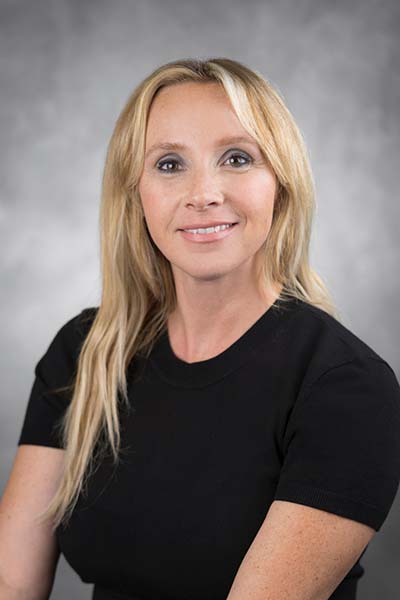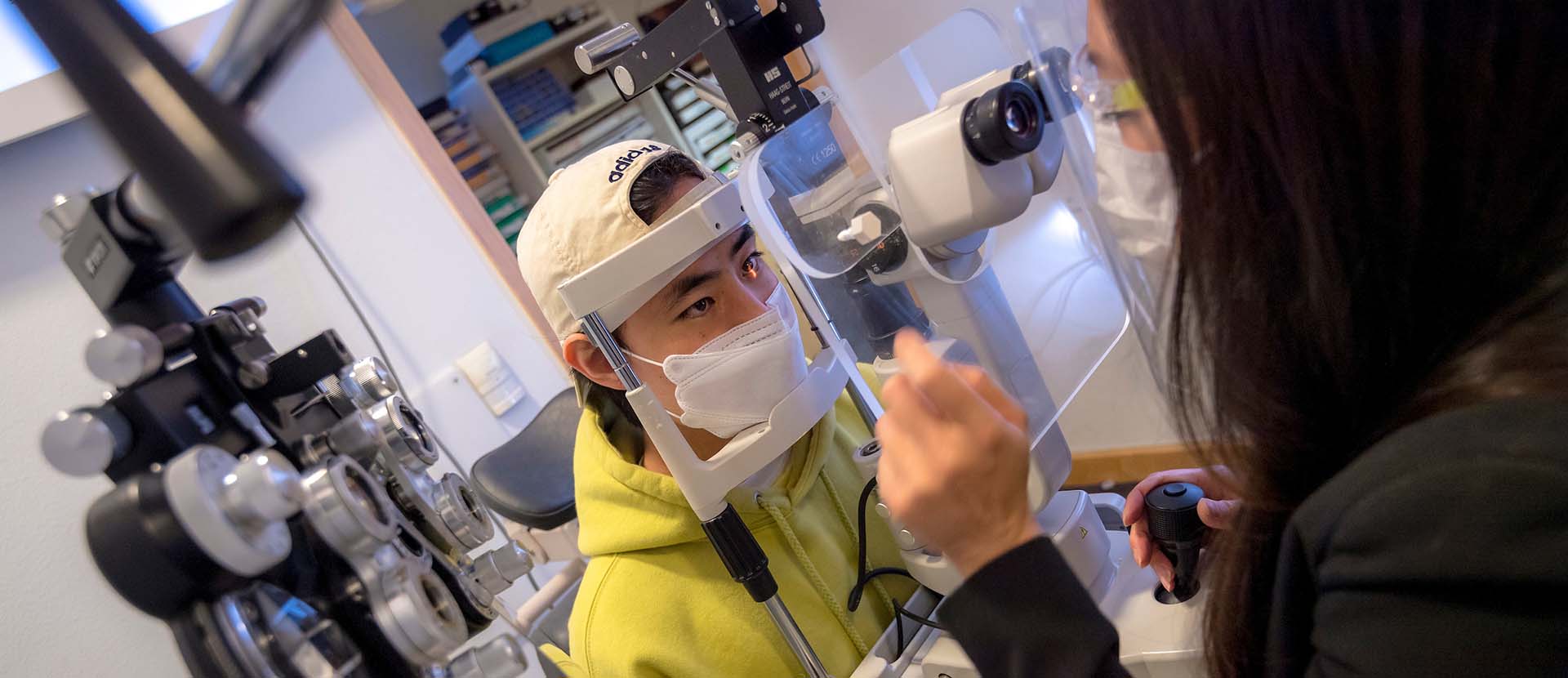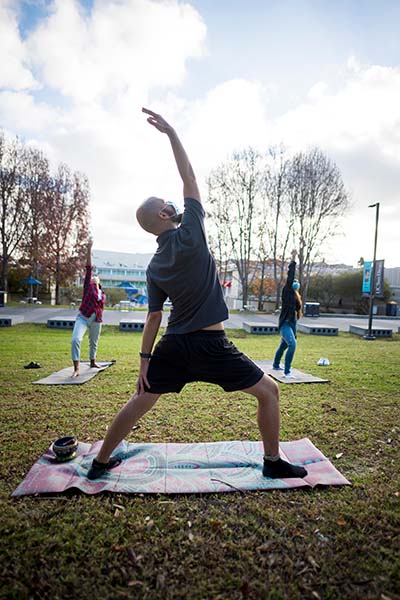New Student Health Leader Envisions Holistic, Gender-Affirming Care
Published Date
Story by:
Media contact:
Topics covered:
Share This:
Article Content
UC San Diego welcomes Susan Fila, Ph.D, L.C.S.W., as the new Executive Director of Student Health and Well-Being (SHW), a cluster that includes Student Health Services, Counseling & Psychological Services, Health Promotion Services and Administration. In her role, Fila oversees the campus’s student clinical and mental health services that are available at little to no cost to over 42,000 enrolled undergraduate, graduate and professional students.
“What drew me to UC San Diego was really being able to address student health and well-being needs on a larger scale,” Fila explained. Originally from New York, Fila has a background in social work with training around holistic care. “Working in higher education was attractive because it felt aligned with my value system of caring for the whole individual.”

One of Fila’s focuses is to increase the skill and prevalence of integrated care teams for students that work together to treat a student’s individual needs. She explained that, for effective and compassionate treatment, health and well-being treatment providers need to be aware of holistic care techniques that connect students to specialists. Student Health and Well-being providers are already engaged in this type of care so there is a strong foundation that exists to enhance holistic care for UC San Diego students.
“Care doesn’t stop in the office of student health and well-being—we want to provide students with a warm handoff to a specialist, provide education about how to go through the process and then follow up to check in and see how that referral went. This type of work is happening in so many spaces so we can learn from each other on best practices.”
For Fila, one of the most exciting and impactful aspects of her role as executive director has been brainstorming how best to address the diverse needs of the student population and how to make resources easily and readily available through a health equity lens, especially to students who may not have the ability to always put themselves and their well-being first.
“We especially need to understand the unique needs of our students of color and how they might have experienced the healthcare system, knowing these past experiences may not have always been favorable,” said Fila.
“During my undergraduate, graduate, and PhD studies, my well-being wasn’t always first because I was a single parent with a toddler, and I was often up until 3 a.m. writing papers,” Fila added. Like many other parenting students, she didn’t always have the time or energy to access resources. “I get those struggles; well-being can’t always be the priority but there is a balance.”
Now, Fila wants to go directly to the students to find out what they need—not just what she thinks they might need. She explained that working in higher education leaves open the door for innovation and new ideas or ways of doing things. Plus, she added, student voices and advocacy on campus push SHW to be the best that it can be.
“Care doesn’t stop in the office of Student Health and Well-Being—we want to provide students with a warm handoff to a specialist, provide education about how to go through the process and then know ourselves what it means to be an integrative care space.”

Some of that advocacy has come from the UC San Diego Pronouns Project, a student organization created to raise awareness around issues of gender inclusivity. Kyra Black and Angelina Lopez, two of the founding members of the Pronouns Project who both use they/them pronouns, explained that they wanted to help foster accountability that created a more gender-affirming environment on campus.
“Gender diversity has been around for much longer than it’s been widely talked about,” Lopez said. “Our goal is to not only make it more visible, but educate the campus about how to be respectful towards those whose gender identities may not fit into a binary categorization.”
“Creating something that would last beyond our graduation was really important to us,” Black added. SHW has recently partnered with the Pronouns Project to create a more gender-affirming environment at Student Health Services (SHS) and offer more gender-affirming care options for transgender, nonbinary and genderqueer Tritons.
Along with two newly-hired gender-affirming care coordinators and in partnership with the campus’s LGBT Resource Center, Fila’s team is hard at work coordinating and improving efforts both within the cluster and eventually across the campus community. Ultimately, campus gender-affirming care services will include:
- Education for students interested in pursuing gender transition;
- Encouraging exploration of gender identity;
- Connecting students with gender-affirming campus resources;
- Training for the SHW team and campus community about how to make a gender-affirming care environment and how to support students wanting to access gender-affirming care.
“We’re the first UC to hire two gender-affirming care coordinators; there is a huge need on our campus for our trans and nonbinary students students to access this care,” Fila said. “I want UC San Diego to be known as the place that provides cutting-edge practices in regards to gender-affirming care.”
“We’re the first UC to hire two gender-affirming care coordinators; there is a huge need on our campus for our trans and nonbinary students to access this care. I want UC San Diego to be known as the place that provides cutting-edge practices in regards to gender-affirming care.”

Fila is also partnering with UC San Diego Health and campus groups to bring equity, diversity and inclusion training to SHW staff. Addressing structural barriers for minority students is a key part of the equity work she wants to focus on for all of the SHW cluster.
Before coming to UC San Diego, Fila served as the interim associate dean of Health and Well-being at Santa Monica Community College, where she oversaw Student Health, Mental Health Basic Needs and was the co-lead for the Emergency Operations Team during the pandemic. She is a mother of two—with a third child on the way—and enjoys spending time outside with her family.
Her advice for students? Prioritize well-being over everything else when possible. Still, Fila recognizes that this is easier said than done.
“I’m 9 months pregnant and so well-being is always on my mind,” she said. “It’s not easy, but we have to do our best to pay attention to our bodies and take time at least once a day to check in with ourselves. Even if we can try to make well-being a priority as much as possible, we function better.”
You May Also Like
Stay in the Know
Keep up with all the latest from UC San Diego. Subscribe to the newsletter today.




